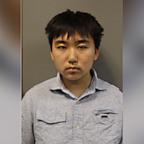New leadership council reveal by Chinese President Xi Jinping shows no successor in sight
The president is set to serve his second five-year term in power.
— -- Chinese President Xi Jinping, Beijing’s most powerful leader since Chairman Mao, unveiled his seven-man leadership lineup Wednesday morning at the Great Hall of the People with himself at the helm.
There was no clear successor among the seven men on the dais, which sends a strong signal that Xi does not intend to step down anytime soon.
These are the six other men who will govern China with Xi for at least the next five years as the Politburo Standing Committee, the top decision-making body in China (in order of seniority:)
Li Keqiang, 62: The current premier of China, a trained economist and a protege of former top leader Hu Jintao. He is the head of the State Council in China. Though not a rival, Li was once tapped to be a potential leader-in-waiting until Xi overshadowed him. He is known as the weakest premier China has had in decades, but has worked in tandem with Xi over the past five years to implement his policies. Speculation that he would be replaced proved unfounded.
Li Zhanshu, 67: A close confidante of Xi who served as his de-facto chief of staff since 2012. He is tapped to lead the National People’s Congress when it meets next March.
Wang Yang, 62: Current vice premier and former party chief of the southern province of Guangdong, the most populous and prosperous province in China. He has a reputation of being liberal-leaning and reform-minded and his current portfolio includes foreign trade, making him a familiar face in D.C. circles.
Wang Huning, 62: Another member of Xi’s inner circle and the party’s intellectual ideologue. A former scholar who was plucked out of academics by the party to advise and formulate policies for the three successive leaders of China: Jiang Zemin, Hu Jintao and of course Xi himself. He helped Xi formulate the "China Dream" and the "Rejuvenation of the Chinese Nation" policy. As an academic, Wang specialized in U.S. politics, which he is known to be critical of. In fact, he espouses the political theory of "Neo-Authoritarianism." He is often seen by Xi’s side during overseas trips. Wang is tapped to oversee China’s propaganda department.
Zhao Leji, 60: The youngest member of this new lineup and tapped to take over China’s relentless anti-corruption campaign from Xi’s longtime ally Wang Qishan (who is stepping down). He is in a unique position because he is the current head of the party’s Organization Department, which keeps tabs on and vets all party members for possible placements and promotions.
Han Zheng, 63: Current party chief of Shanghai and former mayor. He has spent his entire political career in China’s showcase city and is often credited in helping Shanghai bloom back into a competitive world-class city. He served under Xi in 2007 when Xi was Shanghai party secretary for a few months before being tapped for top leadership.
The lineup is experienced, a "Dream Team" of Xi’s choosing, and send strong signals what he intends to achieve in the next half decade. The most worrying signal to some observers, however, it that this is a team with no substitute leader, which could signal he intends to stay in power beyond the next five years and upsetting an informal retirement age for 68 for Chinese officials. Xi will be 69 once the party meets again in 2022.
In the previous decades, younger candidates were introduced into the Standing Committee as potential successors to signal a smooth transition of power as was done for Xi himself a decade ago. All seven members of this new lineup are older than 60.
There was speculation that Xi’s protege Chen Min’er might have been included in the Standing Committee lineup. Despite not making the top rung of power, Chen did get promoted to the 25-seat politburo. In fact, Xi has stacked the new politburo with his younger loyalists.
In the meantime, the current lineup appears to satisfy competing power bases within the party itself while not challenging Xi’s supremacy. The promotion of his own inner circle of Li Zhansu and Wang Huning shows that Xi will continue to tighten his grip on party ideology and promote nationalism unhindered by opposition. This will likely also translate into a more confident, if not aggressive, foreign policy.
While Li and Wang will hold tremendous political power and influence, Li Keqiang, Wang Yang and Han Zheng are among the top Chinese authorities on economic issues, especially related to standard of living. Wang Yang and Han Zheng have proven track records of turning Guangdong province and Shanghai, respectively, into economic powerhouses. Taken with the South China Morning Post’s reporting that Xi’s most-trusted economic adviser, the English-speaking Harvard-trained Liu He is slated to take over Wang Huning’s slot as the party’s top political adviser, it may signal that Xi could finally move ahead with much needed economic reforms in China. But that’s also what everybody thought five years ago.
ABC News' Karson Yiu contributed to this report.




